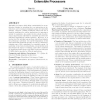Free Online Productivity Tools
i2Speak
i2Symbol
i2OCR
iTex2Img
iWeb2Print
iWeb2Shot
i2Type
iPdf2Split
iPdf2Merge
i2Bopomofo
i2Arabic
i2Style
i2Image
i2PDF
iLatex2Rtf
Sci2ools
102
click to vote
DAC
2004
ACM
2004
ACM
Characterizing embedded applications for instruction-set extensible processors
Extensible processors, which allow customization for an application domain by extending the core instruction set architecture, are becoming increasingly popular for embedded systems. However, existing techniques restrict the set of possible candidates for custom instructions by imposing a variety of constraints. As a result, the true extent of performance improvement achievable by extensible processors for embedded applications remains unknown. Moreover, it is unclear how the interplay among these restrictions impacts the performance potential. Our careful examination of this issue shows that significant speedup can only be obtained by relaxing some of the constraints to a reasonable extent. In particular, to the best of our knowledge, ours is the first work that studies the impact of relaxing control flow constraint by identifying instructions across basic blocks and indicates 5?148% relative speedup for different applications.
Related Content
| Added | 13 Nov 2009 |
| Updated | 13 Nov 2009 |
| Type | Conference |
| Year | 2004 |
| Where | DAC |
| Authors | Pan Yu, Tulika Mitra |
Comments (0)

